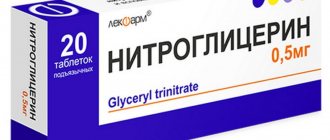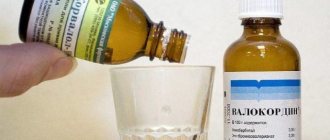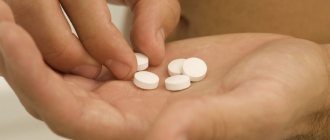Andipal - what kind of remedy?
The medicine Andipal belongs to the group of painkillers, and at the same time is included in the group of psychotropic drugs. Produced by various pharmaceutical companies, "Monfarm", "Uralbiopharm" and others. The composition of the drug is complex, multicomponent. It includes the following substances:
- Analgin, or metamizole sodium
. This substance is a well-known analgesic, one of the most popular means for relieving any pain or inflammatory process. - Dibazole, or bendazole
. Its purpose is to dilate blood vessels, normalize blood pressure, and have a mild sedative effect. With the help of dibazole, blood pressure is reduced for a short period of time; it is used as an emergency remedy. - Papaverine
. It is an antispasmodic (reduces calcium content in cells), eliminates spasm of blood vessels, intestines, stomach, gall bladder and other hollow organs, helps with mild forms of arrhythmia. It also helps normalize blood pressure. - Phenobarbital
. A sedative, sold by prescription only. This medicine is present in very small quantities.
The tablets have a long shelf life (5 years); they must be stored at temperatures up to 25 degrees. There are packages of 10,30,100 tablets on sale, the price of an average package is about 120 rubles.
The main actions of the drug are analgesic, vasodilator and hypotensive.
Additionally, the medicine lowers high temperature, blocks the production of prostaglandins (inflammatory mediators), and increases the sensitivity threshold of special centers of the hypothalamus to pain.
A number of neurological diseases cannot be avoided without taking sedatives. Grandaxin tablets help to establish peace of mind, while having a small number of side effects compared to similar medications. Read more in the article: “Grandaxin tablets indications for use.”
Who is the drug indicated for?
The annotation clearly states what Andipal tablets are for and describes their use. Most often, neurologists and therapists prescribe this medicine against headaches of various origins, including migraines. The use of this drug is especially justified for vascular headaches, the causes of which are associated with cerebral vascular dysfunction.
Like other essential oils, fir oil has many healing properties. For this he is revered in folk and traditional medicine. Composition of fir oil and its actions If you break down fir oil into its components, you get an impressive list. Read more in the article: “fir oil beneficial properties and uses.”
WE RECOMMEND THE ARTICLE!
The drug Maxigan is recommended for headaches; it quickly eliminates discomfort. Read more >>
The medicine will be useful for colic and other types of pain from the peritoneal organs; it quickly relieves spasm of smooth muscles when:
- increased gas formation;
- movement of stone along the ureter;
- exacerbation of cholecystitis, etc.
Advertising:
Andipal tablets help with high blood pressure. As they normalize blood pressure levels, they are taken only in the initial stages of hypertension. Advanced arterial hypertension requires treatment with more powerful and long-acting drugs.
As a one-time measure, the drug can be taken when the “upper” pressure increases to 160-170 units, but not higher.
The tablets quickly reduce any pain, while they have a sedative effect. Hypertensive patients with a tendency to crisis states cannot relieve headaches with Andipal - they may experience sudden surges in pressure after its effect ends.
When should you take the pills?
Doctors usually prescribe Andipal to patients with high blood pressure; hypertension is the main indication for using the drug. For hypertensive patients, the medication is prescribed in systematic courses, since the disease is not treated case by case with the next jump in blood pressure. It should be noted that with high blood pressure, the drug acts gently, without causing changes in well-being. Doctors also recommend the medicine to those patients in whom signs of hypertension have just been identified (in the initial stages of the pathology).
In addition to hypertension, the indications for use of Andipal are as follows:
- dysuria;
- inflammatory processes of the trigeminal nerve;
- primary hypertension;
- cholelithiasis;
- headaches arising as a consequence of traumatic brain injury;
- atypical pain in the facial area;
- hypertensive-hydrocephalic syndrome (in common parlance, increased intracranial pressure).
Patients drink Andipal for pain and spasms of various origins, provided that they do not have hypotension. The medicine also relieves migraine attacks well due to its antispasmodic, vasodilating and anesthetic properties.
Instructions for use
The medicine is allowed to be taken by adults and adolescents; children under 14 years of age are prohibited from taking it. The consumption of the drug is carried out strictly taking into account the indications and purpose; the drug cannot be abused due to the risk of side effects. The norms and methods of administration are as follows:
- Take a pill once to reduce blood pressure if it is slightly elevated or against a headache. It is acceptable to take 1-2 tablets at a time.
- As a course of treatment, take the drug 1-2 tablets up to 3 times a day for no longer than 7-10 days. Such treatment can only be carried out after a medical prescription. An individual course is selected depending on the type and severity of the problem.
You need to take the drug during meals, or you can drink it 5-10 minutes after eating. Andipal works effectively even on a full stomach, and this rule reduces the risk of developing side effects. Overdose may have negative consequences. Observed:
Advertising:
- weakness;
- depression of consciousness;
- dizziness;
- lethargy;
- drowsiness.
Treatment is symptomatic. If the first signs of an overdose are detected, the patient should immediately be given activated charcoal and, if necessary, perform a gastric lavage.
Contraindications and side effects
Taking the drug is not recommended for children under 8 years of age, pregnant and lactating women. The harmful effect of tablets on a child’s body is the effect of phenobarbital components on brain cells. Andipal should not be used during pregnancy due to the negative impact of its components on the development of the fetal nervous system. If a woman takes the drug, the baby will develop intrauterine defects, diseases of the nervous system, damage to the speech apparatus and sensory organs.
List of additional contraindications:
- individual sensitivity to the active ingredients of the product;
- renal and liver failure;
- increased heart rate;
- any pathologies of the cardiovascular system, including heart failure;
- intestinal obstruction;
- blood diseases (hemophilia, leukemia and others);
- glaucoma in any form.
Taking Andipal at low blood pressure provokes a deterioration in the patient’s condition
Headaches intensify, visual function deteriorates, a veil forms before the eyes or “spots” flash. Regardless of whether a person ate food the day before, vomiting occurs. This condition requires medical attention, so it is better to avoid it and not drink Andipal if you have hypotension. Andipal also has side effects:
- liver dysfunction;
- allergic reactions;
- decreased concentration and reactions;
- feeling of drowsiness and weakness.
If a person drinks Andipal in the recommended course (up to 30 days in a row), during this period he should not drive or engage in work that requires increased concentration and clear psychomotor reactions. A separate side effect is a decrease in blood clotting. Also, when taking the drug, physical activity may decrease, and the tendency to apathy and depression may increase. To avoid such actions, Andipal should be taken strictly according to the instructions and according to the doctor’s recommendations.
What result can be achieved by exceeding the dose of the drug? As a result of an overdose, vomiting occurs, epigastric pain appears, and cardiac pressure decreases. In such a situation, gastric lavage and sorbents (activated carbon, Enterosgel, Smecta and others) are required.
No ads 3
How quickly does Andipal reduce blood pressure?
The goal of most drugs for hypertension is to reduce blood pressure in a short time and maintain the resulting therapeutic effect. Andipal is no exception. The medication begins to act within 15 minutes after administration. And some patients noted the onset of action within a few minutes after use. In this case, the maximum amount of the active component in the blood is recorded after 60 minutes, that is, the effect of the drug reaches its peak.
The sedative effect of use may last even longer. The general therapeutic effect lasts on average up to 4-6 hours. However, the rate of reduction in blood pressure and the manifestation of the sedative properties of the drug are influenced by the following factors:
- Eating. The medicine must be taken 10 minutes after breakfast or lunch. On an empty stomach, the effect of the drug may begin faster and lead to an uncontrolled drop in blood pressure.
- Associated pathologies. Patients with hypertension usually have other abnormalities in the body. Therefore, Andipal is more often used in complex treatment with diuretic and analgesic medications.
- Sensitivity to the components of the drug. This medication is not recommended for some patients because the body's response to the treatment may be too strong.
- Dosage. When taking a double dose of the drug, the pressure decreases faster, but it can reach excessively low levels. But you are allowed to take up to 4 tablets of the drug per day.
- Duration of reception. Course treatment of the drug is not recommended, since long-term therapy may lead to addiction. The resulting course of treatment should not exceed 7 days.
Advertising:
The rapid therapeutic effect of taking Andipal is ensured by rapid absorption in the gastrointestinal tract. But at the same time, the drug has a gentle effect on the body and does not cause systemic side effects.
What else affects the speed of action?
The effect of the drug is also affected by other medications included in the course of treatment. Medicines that have an astringent or coating effect on the stomach slow down the absorption of the active components of Andipal, thereby reducing the severity of the therapeutic effect.
Taking adsorbents leads to a decrease in the therapeutic effect of the drug. Adsorbent substances accelerate the removal of the main components from the body, so when taking these medications in combination, the pressure may not decrease at all. The solution is to take these medications at different times with a difference of at least 2-3 hours.
Diuretics accelerate and enhance the effect of Andipal. This occurs due to the rapid expansion of blood vessels and the removal of excess fluid from the body. In addition to diuretics, the following can enhance the hypotensive effect:
- calcium channel blockers;
- ganglion blockers;
- beta blockers;
- antispasmodics from the myotropic group.
Concomitant use of Andipal with opioid analgesics can lead to a mutual enhancement of the effects of both. However, this increases the risk of developing systemic side effects in the form of excessive drowsiness, apathy, and depressive disorders.
Advertising:
It is worth noting that increasing the dose of the drug does not always lead to a rapid decrease in pressure. Therefore, adjusting the dosage yourself is strictly prohibited. If the effect of Andipal is mild, then another antihypertensive drug should be selected to reduce the levels.
Andipal Avexima
The frequency of these side effects is indicated in accordance with the WHO classification: very often - more than 10%; often - more than 1% and less than 10%; infrequently - more than 0.1% and less than 1%; rarely - more than 0.01% and less than 0.1%; very rarely - less than 0.01%, including isolated cases; frequency unknown - based on available data, it was not possible to determine the frequency of occurrence.
For Andipal:
To date, no side effects have been reported with this combination. The incidence of the following possible side effects is unknown.
From the central nervous system
: drowsiness, decreased speed of psychomotor reactions.
From the digestive system
: nausea, constipation.
From the cardiovascular system
: arterial hypotension.
Allergic reactions.
With long-term use
: leukopenia, agranulocytosis, impaired liver and kidney function.
For Metamizole sodium:
From the skin
: uncommon - persistent drug rash; rarely - rash (for example, maculopapular); very rare: Stevens-Johnson syndrome, toxic epidermal necrolysis.
From the urinary system
: very rarely - acute renal dysfunction, which in very rare cases can lead to proteinuria, oligo- or anuria and acute renal failure, acute interstitial nephritis.
From the hematopoietic organs
: rarely - leukopenia; very rarely - agranulocytosis, including fatal cases, thrombocytopenia; frequency unknown - aplastic anemia, pancytopenia, including fatal cases.*
*These reactions can occur even if metamizole sodium has not previously caused complications. There are a number of signs of an increased risk of agranulocytosis if metamizole sodium is used for more than one week. This reaction is dose-independent and can occur at any time during treatment. It is manifested by high fever, chills, sore throat, pain when swallowing, inflammation of the mucous membranes of the mouth, nose, throat, genital and anal area. However, when antibiotics are used, these phenomena may be mild. There is a slight enlargement of the lymph nodes and spleen or no enlargement at all. The erythrocyte sedimentation rate increases significantly, the content of granulocytes is sharply reduced or they are not detected. As a rule, but not always, normal levels of hemoglobin, red blood cells and platelets are maintained. Treatment tactics involve immediate discontinuation of the drug, i.e. the drug should be discontinued immediately, without waiting for laboratory results, if there is an unexpected deterioration in general condition, the fever does not subside, or new or painful ulcerations appear on the mucous membranes, especially in the mouth, nose or throat. If pancytopenia occurs, the drug should be discontinued immediately and a complete blood count should be monitored until its values return to normal.
From the cardiovascular system
: uncommon - isolated decrease in blood pressure (possibly pharmacologically caused and not accompanied by other manifestations of anaphylactic/anaphylactoid reactions). The decrease in blood pressure can be pronounced. During fever, a dose-dependent sharp decrease in blood pressure without other signs of a hypersensitivity reaction is also possible.
Allergic reactions
: rarely - anaphylactoid or anaphylactic reactions; ** very rarely - analgesic bronchial asthma. In patients with analgesic bronchial asthma, intolerance usually manifests itself as attacks of bronchial asthma; frequency unknown: anaphylactic shock.**
**These reactions are especially common with parenteral administration of metamizole sodium and can be severe and life-threatening, in some cases leading to death. These reactions can occur even if metamizole sodium has not previously caused complications. These reactions may occur during administration or immediately after ingestion, or develop several hours later. However, they predominantly occur within the first hour after application. In milder cases, they manifest as rashes on the skin and mucous membranes (eg, itching, burning, redness, blistering and swelling), shortness of breath and, less commonly, gastrointestinal disorders. In severe cases, these mild reactions can develop into generalized urticaria, severe angioedema (including of the larynx), severe bronchospasm, cardiac arrhythmia, arterial hypotension (in some cases it is preceded by increased blood pressure, shock. In this regard, at the first signs skin reactions, the drug should be discontinued.
Others
: Not known: Red urine has been reported and may be due to the presence of low concentrations of rubazonic acid (a metabolite of metamizole sodium).
For Phenobarbital:
From the central nervous system
: frequency unknown - asthenia, dizziness, general weakness, ataxia, nystagmus, paradoxical reaction (especially in elderly and weakened patients - agitation), hallucinations, depression, nightmares, syncope.
From the digestive system
: frequency unknown - vomiting, liver dysfunction with long-term use.
From the hematopoietic organs
: frequency unknown - agranulocytosis, megaloblastic anemia, thrombocytopenia.
Allergic reactions
: frequency unknown - skin rash, urticaria, swelling of the eyelids, face and lips, difficulty breathing, rarely - exfoliative dermatitis, malignant exudative erythema (Stevens-Johnson syndrome).
Others
: frequency unknown - with long-term use drug dependence.
For Bendazole:
The listed effects appear when used in large doses. When the dose is reduced or the drug is discontinued, these side effects quickly disappear.
From the central nervous system
: frequency unknown - dizziness, headache.
From the skin
: frequency unknown - increased sweating.
From the digestive system
: frequency unknown - nausea.
For Papaverine hydrochloride:
From the central nervous system
: often - drowsiness.
From the skin
: often - skin rash (usually erythematous, urticaria), infrequently - itching, rarely - increased sweating.
From the digestive system
: often - nausea, constipation, infrequently - increased activity of liver transaminases.
From the cardiovascular system
: often - decreased blood pressure, infrequently - ventricular extrasystole.
From the hematopoietic organs
: very rarely - eosinophilia.
At what pressure can it be taken?
Not every patient knows whether Andipal increases or decreases blood pressure. The drug is prescribed for hypertension. Papaverine hydrochloride reduces blood pressure. This is an active component, indicated even in cases of hypertensive crisis. Additionally, the patient may experience the following negative effects, which are eliminated by the drug:
- pain in the head caused by vasospasm;
- gastrointestinal pathologies accompanied by pain;
- dizziness, clouding of consciousness.
Actions occur thanks to metamizole sodium, phenobarbital, bendazole. The product has an immediate effect. Therefore, the patient’s blood pressure immediately decreases. It happens smoothly. The risk of pressure changes resulting in a crisis is reduced.
Normal blood pressure should be within 120/70. If a person is not hypertensive, the indicator may be slightly overestimated. But when the pressure rises to 140 and above, the use of the product is required. It is better to use the medicine only in the presence of arterial hypertension, accompanied by severe pain. Due to the presence of papaverine, the drug is used when you need to quickly reduce blood pressure.
Composition and principle of action of the drug
To understand what Andipal blood pressure pills help with, you need to familiarize yourself with their composition:
- Bendazole or dibazole are substances that help eliminate the narrowing of capillaries, as a result of which spasms disappear and blood pressure levels decrease. The component also helps activate spinal cord tissue and has an immunomodulatory effect. Treats diseases of the nervous system and is used to get rid of spastic conditions of the gastrointestinal tract.
- Metamizole sodium is the main active ingredient of Analgin tablets, so the properties of the component are clear. Allows you to reduce pain, eliminate inflammation, and acts quickly.
- Phenobarbital is a component with a pronounced sedative and hypnotic effect. It helps reduce spasms of smooth muscles in combination with anesthetics and antispasmodics. It belongs to the group of drugs against epilepsy, but successfully complements the composition of this medicine.
- Papaverine hydrochloride - high doses of the substance affect the slowdown of cardiac conduction and its excitability. Relieves spasms of capillaries and smooth muscles of internal organs.
Based on the action of the listed components of the product, the question of whether Andipal increases or decreases blood pressure (BP) can be answered in the affirmative - it reduces levels and helps eliminate pain. But you should not take Andipal with low blood pressure - the drug will further aggravate the condition of hypotension, intensify headaches, and can cause fainting, hand tremors and breathing problems. Despite the good analgesic and anti-inflammatory properties, it is better for a patient with low blood pressure to relieve headaches and spasms in the gastrointestinal tract with other medications that do not affect blood pressure.
At what pressure should Andipal be taken? The drug is indicated for use by hypertensive patients with sudden jumps in blood pressure, when it is no longer possible to lower it using conventional methods. If a hypertensive patient, when signs of increased pressure develop, opens a window, providing an influx of fresh air, takes a comfortable position, takes a few deep breaths, but this does not make him feel better, he should take a pill.
No ads 1
Metamizole sodium (Analgin) is the first to enter the fight. It eliminates pain and helps reduce the level of inflammation, normalizes temperature if it is elevated, restores efficiency and vigor, and relieves swelling of soft tissues. Next, the component papaverine is connected - it eliminates spasms of smooth muscles, which causes pain in the gastrointestinal tract (GIT) and head to go away, blood vessels relax, and blood permeability improves.
Dibazol eliminates increased blood pressure by reducing blood pressure on the arteries and small vessels. The heart rate decreases and blood flow speed normalizes. Phenobarbital is the last to act - it relieves psycho-emotional stress, since it is part of many medications with a sedative effect.
Negative aspects of the drug and contraindications
Breastfeeding and under 14 years of age are strict contraindications to treatment with Andipal. During pregnancy, for health reasons, you are allowed to take the pill once, but only in the 2-3 trimesters. The first trimester is also a contraindication, as are the following conditions:
Advertising:
- hypersensitivity, allergy to the components of the tablets;
- disturbance of atrioventricular conduction;
- kidney and liver dysfunction in the decompensated stage;
- blood pathologies;
- porphyria;
- myasthenia gravis;
- angina pectoris;
- intestinal obstruction.
Among the “side effects,” the most commonly observed gastrointestinal disorders are constipation, nausea, and abdominal pain. Allergic reactions often appear - rash, redness of the skin, hives. Possible kidney damage (development of nephritis), urine staining red. Some patients experience hyperhidrosis, drowsiness, and fatigue. A long course increases the risk of changes in the peripheral blood picture.
Andipal's analogs
In terms of the set of components, the drug has no analogues, therefore it is unique. There are a number of analogues in pharmacies for their action.
| A drug | Compound | Price, rubles |
| Unispaz | Paracetamol, Drotaverine | 160 |
| No-Shpa | Drotaverine | 50 |
| Papazole | Bendazole, Papaverine | 20 |
| Urolesan | Herbal Ingredients | 420 |
| Nomigren | Propyphenazone, caffeine, ergotamine, camilofine, mecloxamine | 630 |
Andipal should not be taken simultaneously with other painkillers, drugs for vascular spasm, or anti-inflammatory drugs. Barbiturates inhibit the effectiveness of the pills. Treatment with Andipal in children under 14 years of age can cause mental retardation. The medicine is strictly forbidden to be taken with alcohol due to the enhanced effect of ethyl alcohol on the body.







